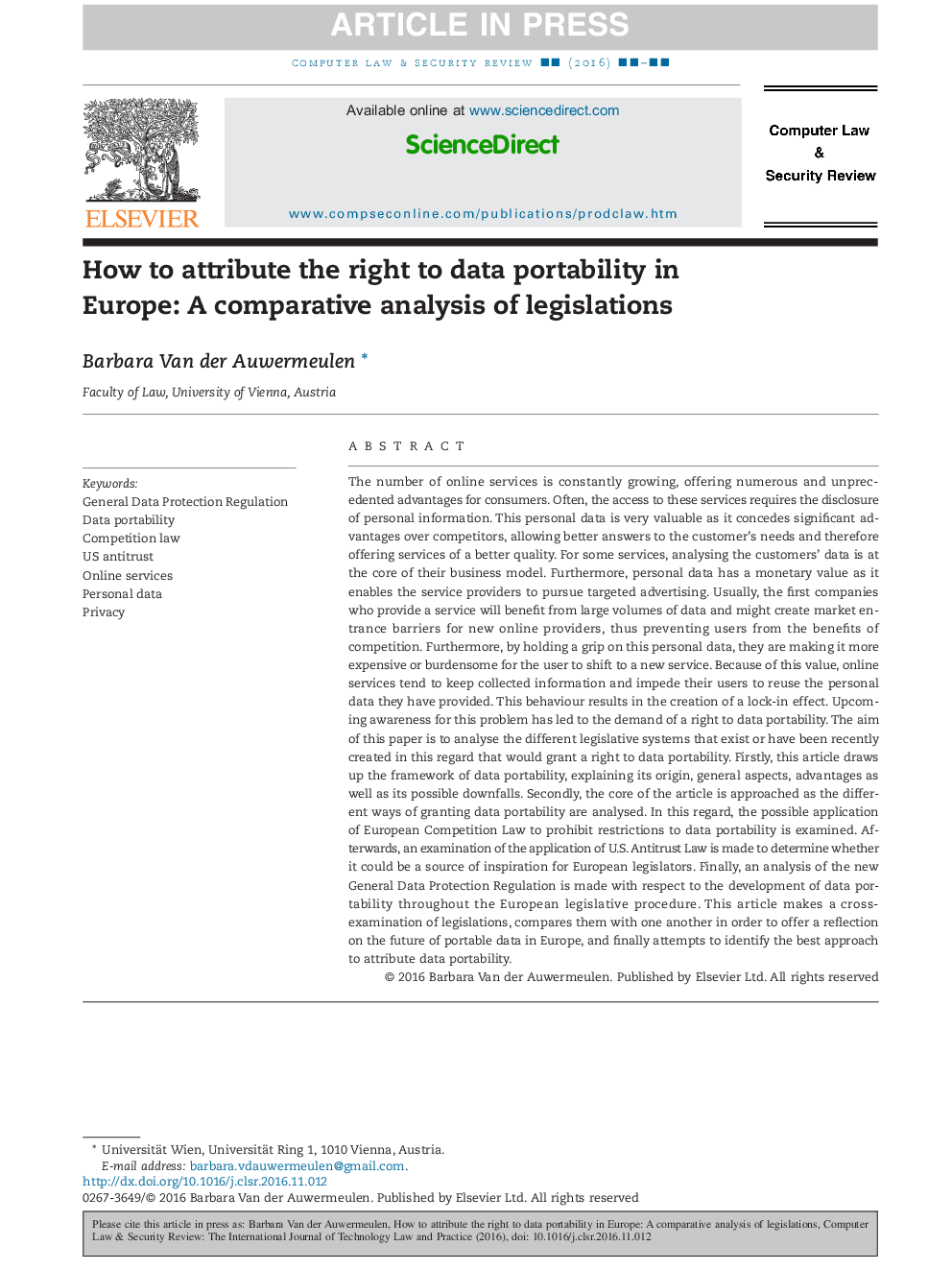ترجمه فارسی عنوان مقاله
چگونه حق دسترسی به داده ها را در اروپا تخصیص می دهیم: یک تحلیل مقایسه ای از قوانین
عنوان انگلیسی
How to attribute the right to data portability in Europe: A comparative analysis of legislations
| کد مقاله | سال انتشار | تعداد صفحات مقاله انگلیسی |
|---|---|---|
| 104675 | 2017 | 16 صفحه PDF |
منبع

Publisher : Elsevier - Science Direct (الزویر - ساینس دایرکت)
Journal : Computer Law & Security Review, Volume 33, Issue 1, February 2017, Pages 57-72
ترجمه کلمات کلیدی
مقررات حفاظت از اطلاعات عمومی، قابلیت انتقال اطلاعات، قانون رقابت، ضد ترویج آمریکا، خدمات آنلاین، اطلاعات شخصی، حریم خصوصی،
کلمات کلیدی انگلیسی
General Data Protection Regulation; Data portability; Competition law; US antitrust; Online services; Personal data; Privacy;
ترجمه چکیده
تعدادی از خدمات آنلاین به طور مداوم در حال رشد است، ارائه مزایای متعدد و بی سابقه برای مصرف کنندگان. اغلب دسترسی به این خدمات مستلزم افشای اطلاعات شخصی است. این اطلاعات شخصی بسیار ارزشمند است زیرا مزایای قابل توجهی را نسبت به رقبا به دست می دهد، پاسخ های مناسبتری به نیازهای مشتری ارائه می دهد و در نتیجه خدماتی با کیفیت بهتر ارائه می دهد. برای برخی از خدمات، تجزیه و تحلیل داده های مشتری در هسته مدل کسب و کار آنها است. علاوه بر این، اطلاعات شخصی دارای ارزش پولی است، زیرا ارائه دهندگان خدمات را قادر می سازد تا تبلیغات هدفمند را دنبال کنند. معمولا اولین شرکت هایی که خدماتی را ارائه می دهند حجم زیادی از اطلاعات را به دست می آورند و ممکن است مانع ورود به بازار برای ارائه دهندگان آنلاین جدید شوند، بنابراین کاربران از مزایای رقابت جلوگیری می کنند. علاوه بر این، با نگه داشتن یک دست بر روی این اطلاعات شخصی، آنها را گران تر و یا سنگین تر برای کاربر برای تغییر به یک سرویس جدید است. به دلیل این ارزش، سرویس های آنلاین تمایل دارند اطلاعات جمع آوری شده را نگه دارند و کاربران خود را مجبور به استفاده مجدد از داده های شخصی که ارائه کرده اند را متوقف کند. این رفتار باعث ایجاد یک اثر قفل می شود. آگاهی آگاهانه برای این مشکل منجر به تقاضای حق دسترسی به داده ها شده است. هدف از این مقاله تجزیه و تحلیل سیستم های قانونی مختلفی است که اخیرا در این زمینه ایجاد شده اند و حق دسترسی به داده ها را فراهم می کنند. اولا، این مقاله چارچوب قابلیت انتقال داده ها را تشریح می کند، منشاء اصلی آن، جنبه های عمومی، مزایا و همچنین آسیب های احتمالی آن را توضیح می دهد. ثانیا، هسته مقاله به این معناست که روش های مختلف انتقال داده قابل حمل، تحلیل می شود. در این راستا، امکان استفاده از قانون رقابت اروپا برای ممنوعیت محدودیت های انتقال داده ها مورد بررسی قرار گرفته است. پس از آن، بررسی قانون استفاده از قانون آنتی تراست ایالات متحده برای تعیین اینکه آیا این میتواند منبع الهام بخش برای قانونگذاران اروپایی باشد، انجام شده است. سرانجام، تجزیه و تحلیل مقررات حفاظت کلی عمومی جدید با توجه به توسعه قابلیت انتقال اطلاعات در سراسر روند قانونی اروپا صورت می گیرد. این مقاله یک بررسی متقابل قوانین را انجام می دهد، آنها را با یکدیگر مقایسه می کند تا بازتابی از آینده داده های قابل حمل در اروپا را نشان دهد و در نهایت تلاش می کند تا بهترین روش برای تعیین قابلیت انتقال داده ها را شناسایی کند.

